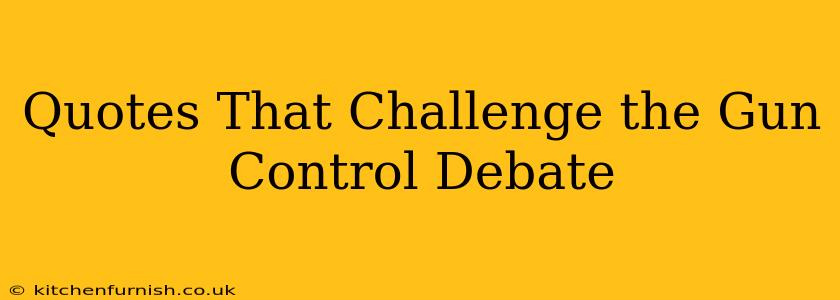The gun control debate is one of the most polarizing issues in the United States, with deeply held beliefs on both sides. Understanding the nuances of this debate requires careful consideration of various perspectives. While statistics and policy analysis are crucial, powerful quotes can offer a different lens, highlighting the emotional, philosophical, and ethical dimensions of the discussion. This article explores several impactful quotes that challenge the status quo and invite deeper reflection on the complexities of gun control. We'll examine how these quotes frame the debate and provoke critical thought.
What are the main arguments for and against gun control?
This is a fundamental question at the heart of the debate. Proponents of stricter gun control often highlight the need to reduce gun violence, pointing to statistics on mass shootings, suicides involving firearms, and accidental deaths. They advocate for measures like background checks, restrictions on assault weapons, and red flag laws to enhance public safety.
Conversely, opponents of stricter gun control emphasize the Second Amendment right to bear arms, arguing that gun ownership is a fundamental right essential for self-defense. They believe that stricter laws would infringe upon this right and would not effectively deter criminals, who will always find ways to obtain firearms. They often advocate for responsible gun ownership, training, and mental health initiatives as solutions to gun violence.
What are the ethical considerations of gun control?
The ethical considerations are profound. On one hand, there’s the moral imperative to protect innocent lives and create a safer society. Stricter gun control measures are seen by many as a necessary step to fulfill this responsibility.
On the other hand, restricting access to firearms raises questions about individual liberty and the right to self-defense. Many believe that the government should not infringe upon the fundamental right to own a firearm, especially given the potential for misuse of power. This leads to a difficult ethical balancing act between public safety and individual freedom.
How do different quotes illuminate the debate?
Let's delve into some quotes that offer diverse perspectives on gun control:
-
"The right of the people to keep and bear arms shall not be infringed." – Second Amendment to the United States Constitution: This is the foundational text for opponents of gun control. It's a concise statement of the right to bear arms, often interpreted as an absolute right with minimal government interference. However, the interpretation of "well-regulated militia" and the extent of "infringement" remain highly debated.
-
"Guns don't kill people, people kill people." – Often attributed to various sources: This quote often appears in the debate, typically used by opponents of stricter gun control. It emphasizes the role of human agency in violence, suggesting that focusing solely on guns misses the larger issue of societal factors contributing to violence. However, critics argue this statement ignores the significant role that readily available firearms play in increasing the lethality of violence.
-
"The only thing that stops a bad guy with a gun is a good guy with a gun." – Often attributed to various sources: This is a common argument for the right to carry firearms, suggesting that armed citizens can deter criminals and protect themselves and others. However, this argument overlooks the complexities of armed confrontations, the potential for escalation, and the possibility of accidental shootings or friendly fire.
-
"We must find common ground. The question is not whether we can end gun violence, but whether we can reduce it." - A synthesized perspective: This statement recognizes the complexity of the issue and proposes a more realistic and pragmatic approach. It suggests that while completely eliminating gun violence might be unattainable, significant reductions are possible through a collaborative effort.
What are the potential compromises and solutions?
The lack of common ground often leads to gridlock. However, exploring potential compromises is essential. These might include:
- Strengthening background checks: Expanding background checks to cover all firearm sales, including those at gun shows and online.
- Red flag laws: Allowing temporary removal of firearms from individuals deemed a danger to themselves or others.
- Investing in mental health: Addressing the mental health crisis, which is often linked to gun violence.
- Gun safety training: Promoting responsible gun ownership and safe handling practices.
The gun control debate is multifaceted and deeply emotional. Understanding the various perspectives requires careful consideration of the arguments, ethics, and potential solutions. The quotes discussed here represent only a fraction of the complex viewpoints, and further research and thoughtful discussion are crucial to finding common ground and working towards a safer future.

